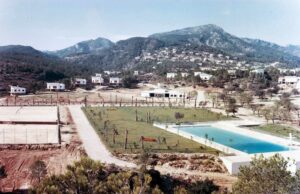In terms of urban planning in Planas de Rey, history is full of court rulings that some would prefer to see fade into oblivion. Yet these judgments are essential pieces of the administrative and legal puzzle that has surrounded our urbanisation since its creation.
One of these rulings, issued on October 29, 2001 by the Juzgado de Primera Instancia de Falset, deserves our full attention. It is neither a spectacular conviction nor a recent controversy, but a discreet legal act with significant consequences.
That day, the court officially considered the transfer of Planas’ shared infrastructures and facilities to the Town Hall of Pratdip as completed, a transfer that should have been carried out nearly a decade earlier by the developer Francisco Lebasque.
A decision that legally settles the endless debate over the ownership of common areas: swimming pools, sports courts, streets, public lighting, green spaces… According to the court, these assets indeed belong to the municipality.
But as often happens in Planas, what the court affirms, the Town Hall ignores…
Analysis of the judgment from the Juzgado de Primera Instancia de Falset – Case 195/2001
Background
- The judgment was issued following a request for judicial enforcement filed by the Urban Conservation Entity of Planas del Rey (EUCC).
- The action was brought against Francisco Lebasque, developer of the Planas del Rey urbanisation, and the Creditors’ Commission.
Origin of the procedure
- The EUCC requested the enforcement of a judgment from November 23, 1993, issued as part of civil case No. 12/90 (minor claim procedure).
- This judgment ordered Francisco Lebasque to formalise by notarial deed the free transfer of several infrastructures and facilities to the Town Hall of Pratdip.
Content of the decision of October 29, 2001
The court, after verifying the legal requirements (representation, jurisdiction, validity of the title), ruled as follows:
Finding of non-compliance
Since the 1993 judgment, Francisco Lebasque has never signed the notarial deed transferring the infrastructures to the Town Hall.
Application of Article 708 of the Civil Procedure Law
- This article provides that if, after a final judgment requiring a declaration of intent (such as signing a deed), the defendant does not comply within 20 days, the court may consider that declaration as issued ex officio by judicial decision.
Decision
- The court declares the declaration of intent by Francisco Lebasque as issued.
- This declaration concerns the free transfer of the following assets:
- The Olympic swimming pool and the small pool with their equipment.
- The five tennis courts.
- The mini-golf course.
- The well and pumps.
- The streets.
- The sewage system.
- All green areas and their plantations.
- The public lighting.
- These assets are now considered officially transferred to the Town Hall of Pratdip.
Additional instructions
- The court requests that the address of Francisco Lebasque be provided for notification purposes.
- It orders the registration of this decision in the Falset Land Registry to ensure its legal validity.
Conclusions and implications
This judgment confirms that, legally, the mentioned assets have been considered as transferred to the Town Hall, even if Francisco Lebasque never formally handed them over by notarial deed.
The Town Hall of Pratdip is therefore, in law, the owner of the mentioned infrastructures and common areas.
Despite this decision, it appears that, in practice, the Town Hall has never taken possession or assumed the management of these infrastructures, which constitutes another problem (political or administrative) beyond the legal framework.
Original document
2001-10-29-procédure-execution-titres-judiciaires-falset-195-2001







